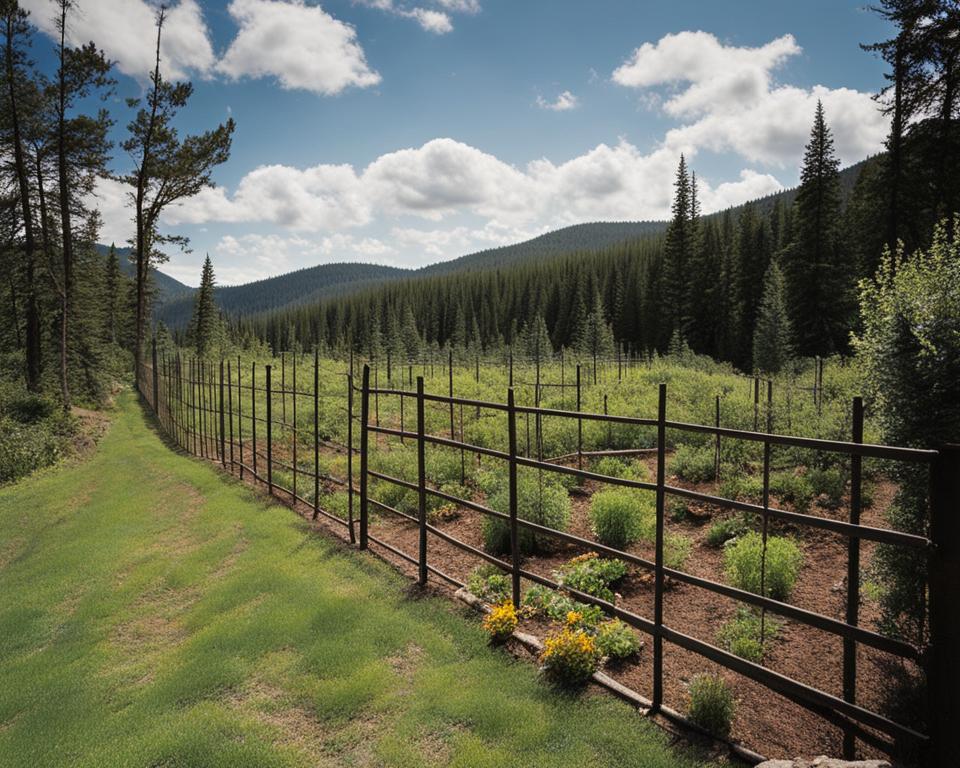The Pros and Cons of Homesteading: Is It Right for You?
Homesteading has become increasingly popular as individuals seek a self-reliant lifestyle. Before diving into homesteading, it’s essential to weigh the pros and cons to determine if this lifestyle is the right fit for you. In this overview, we will explore the benefits and drawbacks of buying and owning a homestead property so that you can make an informed decision.
Homesteading offers a range of benefits that attract many individuals. Some of the key advantages include financial benefits, such as tax exemptions, and the sense of stability and roots in a community. On the other hand, there are also limitations to consider, such as restrictions on property usage and reduced mobility.
Before delving deeper into the pros and cons, let’s take a closer look at what homesteading entails and the lifestyle it offers. Homesteading is a lifestyle characterized by self-sufficiency, where individuals aim to produce their food, generate their energy, and live a more sustainable and self-reliant life. This involves activities such as gardening, raising livestock, and preserving food. It is a way to connect with nature, foster a stronger bond with the land, and embrace a simpler way of living.
As you evaluate whether homesteading is right for you, it is important to consider the positive aspects as well as the potential drawbacks. In the following sections, we will delve into the financial benefits, extra protection and stability, future generational benefits, limitations on property usage, reduced mobility, potential financial constraints, and provide an overview of the benefits and drawbacks of homesteading.
Financial Benefits of Homesteading
Homestead property offers numerous financial benefits that can make it an attractive option for prospective homeowners. These advantages include:
- Property Tax Exemptions: Homesteading often comes with property tax exemptions. These exemptions can significantly reduce the amount you need to pay in property taxes each year, resulting in long-term savings.
- Reduced Tax Assessments: In addition to tax exemptions, homestead properties may also benefit from reduced tax assessments. This means that the assessed value of your property may be lower than its fair market value, resulting in lower property tax bills.
- Affordability: With property tax exemptions and reduced tax assessments, homesteading can increase the affordability of homeownership. These financial advantages can make it easier to manage mortgage payments and other expenses.
By taking advantage of the financial benefits of homesteading, you can enjoy long-term savings and make homeownership more affordable. It’s important to carefully consider these advantages when deciding if homesteading is the right choice for you.
“Homesteading offers significant financial benefits, such as property tax exemptions and reduced tax assessments, which contribute to increased affordability and cost-effectiveness.”
Extra Protection and Stability of Homesteading
When it comes to homesteading, it’s not just about the freedom and self-sufficiency. Homestead laws in many states provide an additional layer of protection for homestead property owners. These laws limit the amount of the property’s value that can be seized, ensuring that your home remains secure even during challenging times.
Imagine the peace of mind that comes with knowing that your property is safeguarded and that you have a stable place to call home. Homesteading offers not only financial advantages but also a sense of stability that can greatly enhance your quality of life.

By embracing the homesteading lifestyle, you have the opportunity to establish roots in a community. This fosters a stronger sense of belonging and well-being, allowing you to build meaningful connections with your neighbors and surroundings.
Homesteading not only offers financial benefits but also provides a sense of stability and belonging. It allows you to protect your property’s value and establish roots in a community, giving you peace of mind and a place to call home.
Having a place to call your own and a community to rely on can provide a deep sense of stability. It creates a solid foundation from which you can grow, thrive, and enjoy the benefits of a supportive and nurturing environment.
Protection of Property Value
Homestead laws play a crucial role in protecting the value of your property. By limiting the amount that can be seized, these laws act as a shield, ensuring that you can maintain the value you’ve worked hard to build. This protection offers stability and peace of mind, regardless of the external circumstances that may arise.
Fostering a Sense of Belonging
Homesteading allows you to establish roots in a community, creating a sense of belonging like no other. The connections you forge with your neighbors and the shared experiences of living a self-sufficient lifestyle can form strong bonds and lasting friendships. This sense of community and belonging enhances your overall well-being and creates a supportive network that you can rely on.
Ultimately, homesteading not only provides financial benefits but also offers extra protection for your property and a stability that comes from establishing roots in a community. It’s a lifestyle that allows you to build a solid foundation and create a sense of belonging, all while enjoying the many advantages of living a self-sufficient and fulfilling life.
Future Generational Benefits of Homesteading
When you embark on the journey of homesteading, you not only create a sustainable lifestyle for yourself but also leave a lasting legacy for future generations. By establishing homestead status, you secure a property that can be passed down to your children and grandchildren, providing them with a valuable asset for their future.
Property inheritance is one of the most significant future generational benefits of homesteading. Unlike other types of properties that may be subject to complex inheritance laws and potential disputes, a homestead property carries a sense of stability and security. Knowing that you are leaving behind a piece of land that holds sentimental value and financial security ensures your family’s well-being in the long run.

Financial security is another advantage of homesteading that extends to future generations. As property values tend to appreciate over time, owning a homestead property can serve as a valuable investment that increases in worth. This asset can provide a safety net for your family, allowing them to build wealth and enjoy financial stability for years to come.
“Homesteading allows us to create a legacy, providing for our descendants and ensuring their financial security.”
Furthermore, homesteading fosters a sense of responsibility and self-reliance in future generations. By teaching your children and grandchildren valuable skills such as gardening, animal husbandry, and sustainable practices, you equip them with the knowledge and tools necessary to thrive in an ever-changing world. These skills not only provide practical benefits but also promote a deeper connection with nature and a heightened appreciation for the environment.
Limitations on Property Usage in Homesteading
While homesteading offers numerous benefits, it’s crucial to be aware of the restrictions that come with it. Homestead laws typically impose limitations on the use and development of the property, which can affect your plans for generating additional income or engaging in commercial activities.
One of the key restrictions involves property usage. Homestead laws often prohibit or restrict commercial activities on the property. This means that you may not be able to operate a business or conduct commercial transactions from your homestead. Restrictions may also apply to leasing out the property, limiting your options for generating rental income.
These property usage restrictions can significantly impact your financial goals and plans for utilizing your homestead property. It’s essential to carefully consider these limitations before committing to homesteading, especially if you have aspirations of starting a business or utilizing your property for commercial purposes.
“Homestead laws often impose restrictions on the use and development of the property.”
There may be additional limitations on property usage that vary by state and local regulations. Depending on the area, you may encounter restrictions on building or expanding structures on your homestead property. It’s important to familiarize yourself with the specific regulations in your location to avoid any compliance issues.
Ultimately, being aware of these limitations on property usage in homesteading allows you to make informed decisions and align your expectations with the reality of homesteading life. It’s crucial to evaluate your goals and aspirations for your property and determine if the potential commercial limitations and leasing restrictions align with your long-term plans.

Reduced Mobility in Homesteading
Homesteading property typically requires a level of commitment and may limit your ability to easily relocate or sell the property. This can be a disadvantage if you have a job that requires frequent moves or anticipate the need to relocate in the future. It’s important to consider your future mobility needs before committing to homesteading.
While the homesteading lifestyle offers numerous benefits, such as financial stability and the opportunity to establish roots in a community, it’s essential to acknowledge the potential limitations it may impose on your mobility.
One aspect to consider is the difficulty of selling a homestead property. Due to the specialized nature of homesteading and the unique features of these properties, finding a suitable buyer may prove challenging. This limited market can lead to longer selling times and potential difficulty in recouping your investment.
Additionally, if you have a job that requires constant relocation, such as a traveling salesperson or a military service member, the commitment to a homestead property may not align with your career requirements. The time and effort dedicated to maintaining a homestead can conflict with the demands of job mobility, making it impractical in such situations.
Furthermore, should you anticipate the need to relocate for personal reasons, such as caring for elderly family members or pursuing educational opportunities, the limitations of homesteading may hinder your ability to do so. Selling a homestead property quickly in such circumstances can prove challenging, potentially causing delays and complications in your relocation plans.
“Homesteading property typically requires a level of commitment and may limit your ability to easily relocate or sell the property.”
Before committing to the homesteading lifestyle, carefully evaluate your job requirements and potential future mobility needs. Consider whether the reduced mobility and difficulty in selling property align with your long-term goals and aspirations. It’s crucial to make an informed decision that suits your personal circumstances and ensures a harmonious relationship between your career, lifestyle, and investment.
Potential Financial Constraints in Homesteading
While homestead property offers financial benefits, it’s important to be aware of potential financing challenges that may arise. One such challenge is the eligibility for FHA loans. Many homestead properties do not meet the criteria for FHA loans, which can impact the financing options available to prospective homesteaders.
One of the key requirements for an FHA loan is that the property must meet certain conditions and standards. In some cases, homestead properties may not meet these requirements due to their unique characteristics or location. This means that homesteaders may need to explore alternative financing options or secure a larger down payment to proceed with their homesteading plans.
Having a larger down payment may be necessary when financing a homestead property that does not qualify for an FHA loan. This can present a financial challenge for those who may be relying on an FHA loan to make their homesteading dreams a reality. A larger down payment may require additional savings or potentially impact other financial goals.
It’s important to carefully consider these potential financial constraints when deciding if homesteading is the right choice for you. Evaluating your financial situation, exploring different financing avenues, and consulting with a financial professional can help you make an informed decision and navigate any financing challenges that may arise.

Benefits and Drawbacks Overview of Homesteading
Homesteading offers a range of benefits that can enhance your lifestyle and well-being. From enjoying fresh and tasty food to creating a more affordable way of living, homesteading provides numerous advantages.
Fresh and Tasty Food
One of the greatest benefits of homesteading is the ability to grow your own food. By cultivating a variety of fruits, vegetables, and herbs, you can indulge in the freshest and most flavorful produce. Say goodbye to store-bought produce that lacks flavor and nutrition, and savor the deliciousness of homegrown ingredients.
Affordability
Homesteading offers a cost-effective alternative to traditional living. By producing your own food and reducing your reliance on grocery stores, you can significantly lower your monthly expenses. Additionally, the ability to generate income through selling surplus produce or homemade goods adds to the affordability of this lifestyle.
Exercise and Well-being
Homesteading is a physically demanding lifestyle that provides plenty of exercise opportunities. From tending to the garden to caring for livestock, daily chores keep you active and promote a healthier lifestyle. Engaging in manual labor not only helps you stay fit but also brings a sense of satisfaction and accomplishment.
Family Bonding
Homesteading offers a unique chance to strengthen family bonds. Engaging in activities such as gardening, cooking, and animal care together fosters teamwork, communication, and shared responsibilities. Working together towards a common goal creates a sense of unity and strengthens the family unit.
Space and Freedom
Living on a homestead provides ample space for you to roam, explore, and enjoy the tranquility of nature. You have the freedom to design and cultivate your land according to your preferences, creating a personalized space that reflects your values and lifestyle. The abundance of space also allows for a greater level of self-sufficiency.
Health Benefits
The homesteading lifestyle promotes overall health and well-being. By consuming fresh, homegrown food and engaging in physical activities, you can improve your nutrition and fitness levels. The presence of nature on a homestead is also known to have a positive impact on mental health, reducing stress and promoting relaxation.
Sustainability
Homesteading encourages sustainability and environmental friendliness. By adopting practices such as composting, rainwater harvesting, and using renewable energy sources, you can minimize your carbon footprint and contribute to a healthier planet.
Fewer Rules and Regulations
Another advantage of homesteading is the freedom from excessive rules and regulations. Unlike urban living, homesteading allows you to have more control over your property and lifestyle choices. This autonomy provides a sense of empowerment and the ability to align your life with your values.
While homesteading offers numerous benefits, it’s important to consider the drawbacks as well. The time-consuming nature of homesteading requires dedication and a considerable investment of time and effort. Additionally, acquiring various skills, making sacrifices, and adapting to a different way of life can pose challenges along the journey. However, for those who are passionate about self-sufficiency and sustainable living, the benefits of homesteading often outweigh the drawbacks.
Homesteading as a Quiet and Safe Lifestyle
If you long for peace and quiet, homesteading offers an ideal lifestyle away from the hustle and bustle of the city. The serene surroundings of rural areas provide the tranquility you seek, where you can escape the noise and chaos of urban living. Embracing homesteading allows you to breathe in the fresh air, surrounded by the beauty of nature, creating a truly peaceful and relaxing experience.

Another advantage of homesteading is the lower crime rates typically found in rural areas. Unlike densely populated cities, rural communities tend to provide a safer living environment, fostering a sense of security and well-being for you and your loved ones. Enjoy the peace of mind knowing that you have chosen a place where crime is less prevalent, allowing you to live a quieter and safer life.
Living on a homestead also guarantees a greater level of privacy. Away from crowded neighborhoods and constricted spaces, you can relish in the solitude and seclusion of your own land. With more space between your neighbors and fewer people passing by, you have the freedom to pursue your daily activities without prying eyes or constant disruptions. Additionally, the freedom to design and build your own homestead allows you to create a private sanctuary that reflects your values and desires.
FAQ
What are the financial benefits of homesteading?
Homesteading offers financial benefits such as property tax exemptions and reduced tax assessments, resulting in long-term savings and increased affordability of homeownership.
How does homesteading provide extra protection and stability?
Homestead laws in many states provide protection by limiting the amount of the property’s value that can be seized. This offers peace of mind and safeguards your home during challenging times. Homesteading also provides stability and the opportunity to establish roots in a community, fostering a stronger sense of belonging and well-being.
What are the future generational benefits of homesteading?
By establishing homestead status, you secure a property that can be passed down to future generations. This serves as a valuable asset and provides financial security for your family’s future. Homesteading allows you to create a legacy and provide for your descendants.
What limitations are there on property usage in homesteading?
Homestead laws often impose restrictions on the use and development of the property. These limitations can limit commercial activities or leasing out the property. It’s important to consider these restrictions if you have plans for commercial ventures or want to generate additional income from your property.
Does homesteading impact mobility?
Homesteading property typically requires a level of commitment and may limit your ability to easily relocate or sell the property. This can be a disadvantage if you have a job that requires frequent moves or anticipate the need to relocate in the future. It’s important to consider your future mobility needs before committing to homesteading.
Are there potential financial constraints in homesteading?
While homestead property offers financial benefits, it may also present challenges in terms of financing. Many homestead properties do not qualify for FHA loans, resulting in a requirement for a larger down payment. It’s important to consider these potential financial constraints when deciding if homesteading is the right choice for you.
What are the benefits and drawbacks of homesteading?
Homesteading offers benefits such as enjoying fresh and tasty food, affordability, getting lots of exercise, family bonding opportunities, having lots of space, improved health, environmental friendliness, and fewer rules and regulations. However, there are drawbacks to consider, including the time-consuming nature of homesteading, sacrifices that need to be made, and the need to acquire various skills.
How does homesteading provide a quiet and safe lifestyle?
Homesteading provides a quiet and peaceful lifestyle away from the hustle and bustle of the city. Rural areas typically have lower crime rates, offering a safer living environment. Additionally, living on a homestead provides more privacy and freedom from strict building codes and regulations.







